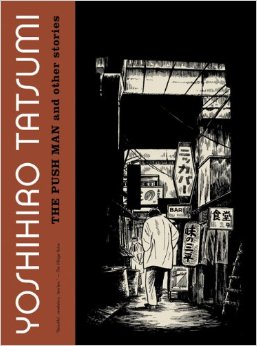
The Push Man and Other Stories by Yoshihiro Tatsumi
On March 7 of this year, Yoshihiro Tatsumi died at the age of 79. Tatsumi was a Japanese manga artist who had been writing and drawing since the ’50s. He is often considered the “godfather of alternative manga” for the way he helped push Japanese comics to more mature and complex story telling. He even coined the term “gekiga” (dramatic pictures) to separate his style from mainstream “manga” (whimsical pictures).
His earlier works, such as Black Blizzard, were more crime and noir oriented. However, the cultural upheavals of the ’60s inspired Tatsumi to look to the people around him for inspiration. The people forgotten and left behind in Japan’s post-war economic boom. These men and women are the subject matter of The Push Man and Other Stories.
As far as I can tell, this collection published by Drawn and Quarterly in 2005 is the first authorized English translation of Tatsumi’s work. Although, as the editor Adrian Tomine notes in the introduction, at least one unauthorized translated collection had been previously floating around.
The titular story, “The Push Man,” is about a student who works part time as a subway pusher. Tokyo subways are so crowded during rush hour that attendants are needed to help pack the people into the trains like sardines. The unnamed push man finds his job uncomfortable and takes solace in studying alone in his room. One day, he meets a woman in the subway who takes a liking to him.
While not my favorite story in the collection, it’s easy to see why this was chosen as the title story. The ending image of the protagonist accidentally being shoved into a crowded train while helplessly screaming, “I’m a push man! Let me out!” is the perfect summary of the lives of Tatsumi’s characters. They’re trapped and ignored while life keeps moving along, completely indifferent to their existence.
The first story in the collection, “Piranha,” is an excellent lead-in. A factory worker intentionally injures himself at work to get an insurance pay out for his wife. His wife uses the money to open up a club, putting them in a better financial position. He seems content to just sit at home and watch his pet piranha swim in their tank, until he finds out his wife is having an affair.
This story is a great example of what Tatsumi excels in. He takes someone who is just a random face in the crowd and zooms in on their deep, dark secrets and their most intimate moments. He does this while walking a fine line between sympathy and criticism.
Troubled relationships are a recurring theme. One of them that I found the most interesting was in the story “Makeup.” An office worker who enjoys going out dressed in his wife’s clothes meets a woman who is convinced he’s also a woman when she meets him. She reveals herself to be a closeted lesbian and begins an affair with him. Even after finding out he’s actually a man, she doesn’t care.
I want to love you as a woman… I have to believe in that…
Tatsumi doesn’t use a lot of dialogue. Most of his stories are driven by the artwork (itself a simple style), but his writing often hits hard. This story also shows the boundaries that Tatsumi was transgressing. To late ’60s Japanese readers, a story like this must have been very shocking.
There are times when his stories dip into horror, though a very subtle type. In “Traffic Accident,” a sexually repressed mechanic becomes obsessed with a sexy television hostess. When she brings her car in to his shop, seeing her in person shatters his idealized image of her. He decides to take revenge.
Another story in this vein is “Bedridden.” An office worker is taking care of a bedridden women in his apartment. When an accident leaves him laid up in the hospital, he leaves her care to a coworker. The coworker soon finds out that the woman is not the man’s wife or girlfriend, but a prostitute whose body had been altered by a sadistic pimp. The man claims he cares for her, but clearly is just using her like the pimp who destroyed her body.
We never see what exactly happened to the women, but it’s implied to be simultaneously grotesque and irresistible to men. The coworker finds her so alluring that he wants her to himself. As mentioned before, Tatsumi’s art style is fairly simple. Despite this, the stories still evoke powerful images. In the case of “Bedridden,” the woman not even being shown leaves whatever happened to her all the more horrifying.
My personal favorite story in the collection is “My Hitler.” A man struggles with his resentment towards his wife. He doesn’t love her anymore, he finds having sex with her a chore and he has no desire to have children with her. He contemplates what the child would be like if he did get her pregnant.
How would it turn out? Probably wouldn’t amount to much. Or maybe… maybe the brat would grow up to be a big-shot, like Napoleon, or… Hitler.
One day, a rat shows up in his apartment and scares his wife. He does what he can to keep it out, but can’t bring himself to kill it when he finds that it’s pregnant. His wife gets fed up and leaves. She assures him that she still loves him, she just can’t go back to the apartment while the rat is there.
The rat gave birth. Six little ones… Cute baby rats… None of them are like Hitler.
The only bad story in the bunch is “Disinfection.” A sexually repressed man whose job seems to consist entirely of disinfecting phones is infatuated with a prostitute who lives in his building. He finally works up the nerve to hire her for a night. In a collection that handles alienation and sexual repression so well, this one just falls flat. It simply lacks the punch that’s present in all the other stories.
The Push Man and Other Stories isn’t for everyone. Tatsumi’s portraits of the Japanese underclass are very bleak and often disturbing. Despite that, this collection will definitely appeal to fans of alternative comics. I would also encourage fans of manga and comics in general to pick this up. Even if the stories don’t appeal to you, it will really expand your horizons of what the medium is capable of.
________________________
 Ben Arzate lives in Des Moines, Iowa. His fiction and poetry has appeared in Ugly Babies, Bizarro Central, Spoilage, The Mustache Factor, Twenty Something Press, and Keep This Bag Away From Children. He blogs at http://dripdropdripdropdripdrop.blogspot.com/
Ben Arzate lives in Des Moines, Iowa. His fiction and poetry has appeared in Ugly Babies, Bizarro Central, Spoilage, The Mustache Factor, Twenty Something Press, and Keep This Bag Away From Children. He blogs at http://dripdropdripdropdripdrop.blogspot.com/
Subscribe to Adventures in SciFi Publishing podcast on: iTunes | Stitcher Radio (Android users) | RSS | Website RSS | AISFP Wormhole newsletter

















Speak Your Mind